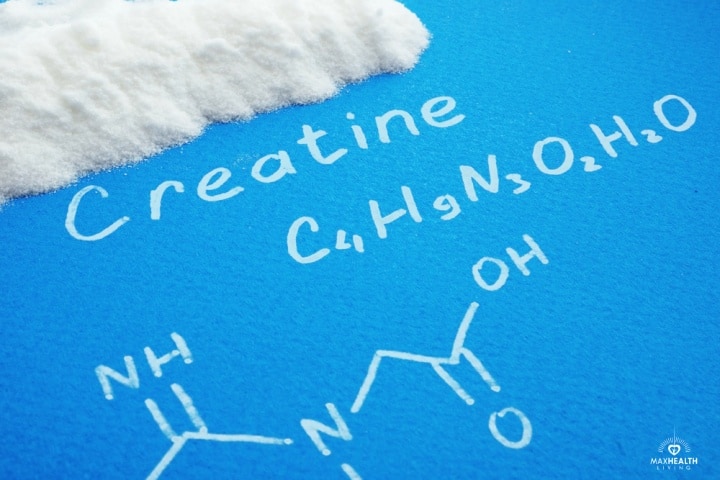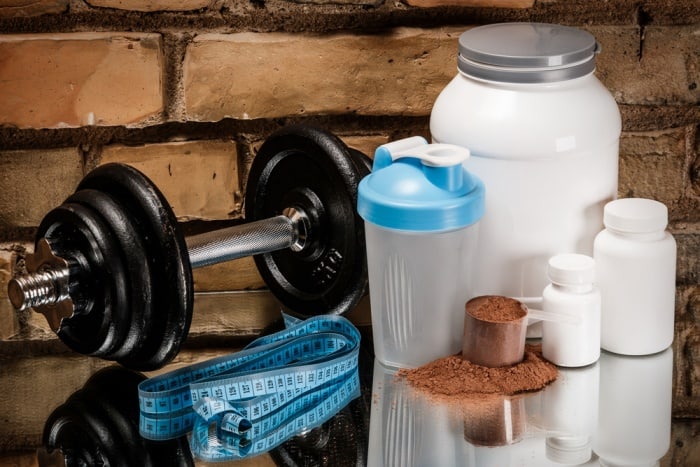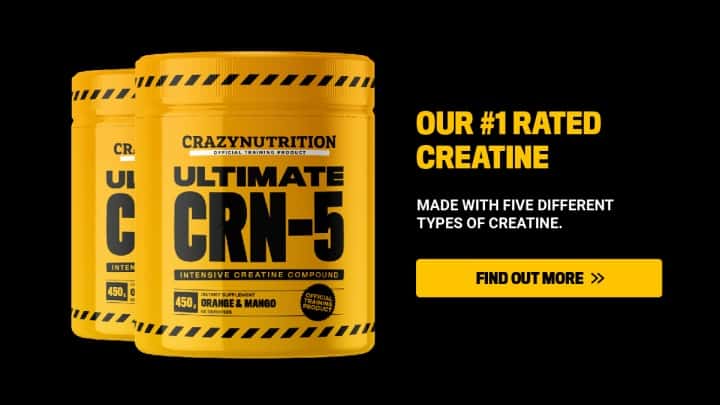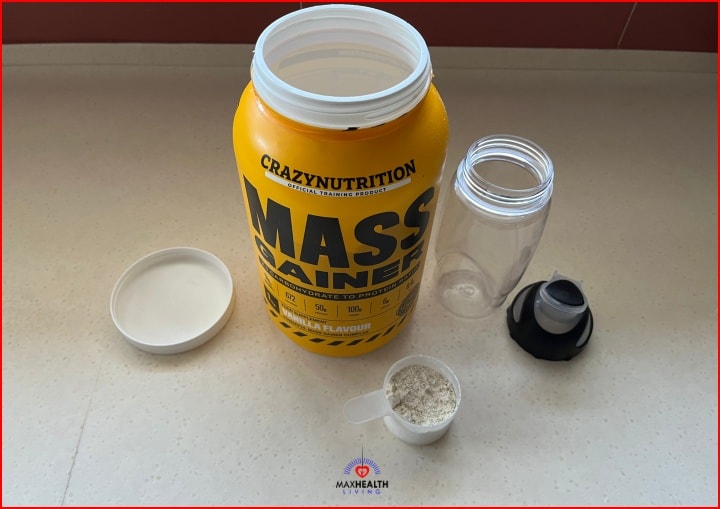Mass Gainer vs Creatine: What’s better? (best taken together?)
Max Health Living is a reader-supported site. Purchases made through links may earn a commission. Learn more.
With both used by athletes and bodybuilders to gain muscles, get energy and strength, and improve muscle recovery, it’s easy to see why people sometimes confuse mass gainers and creatine.
The big question in everyone’s mind: “Is mass gainer and creatine the same thing?”
The answer is no! Mass gainers and creatine are two totally different supplements.
Creatine supplements focus only on creatine, a kind of amino acid derivative used to generate ATP (adenosine triphosphate). ATP is the basic form of energy in your body’s cells, so creatine supplementation can give you energy.
It delays the onset of muscle fatigue, so you can prolong your workout sessions to build more muscles.
Mass gainers can contain creatine, but it also has lots of other components, including carbs, fats, vitamins, minerals, and BCAAs (branch chain amino acids). They’re also good for energy, but mass gainers focus on building muscles.
You might be wondering whether mass gainers and creatine have other similarities or differences.
How do you use them?
Do you think that these two can be used in combination, or is that going to be dangerous?
If you were to choose only one, which is the better choice – mass gainer or creatine?
You can find answers to these questions in this comparison. As someone into bodybuilding, and tried a dozens (and dozens) of supplements over the the last decade – I bring you my own personal experience + research on both creatine and mass gainers.
Let’s delve in:
Mass Gainer vs Creatine – What Are They?
Bodybuilders and athletes find it easier to work out and train harder than their bodies can normally handle, thanks to certain supplements.
Of course, it’s important to stay away from substances that can do more harm than good to your body – especially banned substances! Your hard work and sacrifices during training would mean nothing if you can’t even join a competition or know that you’re cheating yourself.
It’s a good thing that mass gainers and creatine are accepted as safe and effective sports nutrition supplements.
You can choose from either of the two or maybe both if that’s possible (we’ll talk more about this combination below). So, let’s discuss the pros and cons of each one to help you make the right choice.
What is Creatine?

Creatine is a naturally occurring amino acid (protein building block) in your body. It’s synthesized by your body so you probably have enough stores, even if you don’t take supplements.
But if you’re doing intense workouts, creatine can come in handy because it turns into phosphocreatine, which is necessary to create ATP (your cells’ fundamental energy unit).
Supplementation with creatine increases your intramuscular energy stores and delays the onset of muscle fatigue.
Without feeling tired so easily, you can increase your workout intensity and duration.
According to the latest creatine statistics – 64% of studies on Creatine showed an increase in total lean body mass, making it a great choice for supporting muscle growth and justifying its overall popularity.
There are several creatine forms, but creatine monohydrate is the most common form found in supplements. It’s the cheapest and easiest form of creatine, and it also dissolves fairly well in water.
Possible Costs of Creatine
The prices vary among brands, but a 450 g pack (good for 60 servings) of Crazy Nutrition CRN-5 costs $34.99 for a one-time purchase.
Some brands, such as Crazy Nutrition, also offer big discounts (usually around 20%) if you choose to subscribe. It’s actually a good idea to get a subscription because it saves you money and ensures you have ample stocks all the time.
Creatine Pros
The following are the top 5 advantages of using creatine:
- Boosts Your Energy
Did you know that creatine is one of the best supplements for boosting your energy levels? By packing up on ATPs from creatine supplementation, you create more energy stores that don’t get depleted so easily during intense workout sessions.
That means you won’t get as quickly as you normally would, even if you increase your reps.
- Increases Your Muscle-building Capacity
By increasing your energy stores and helping delay muscle fatigue, this supplement helps increase your muscle-building capacity with extended, more intense workouts.
Creatine also helps your muscles recover more quickly, protecting them from damage, fatigue, and soreness. So, you can break out of your workout plateau and get back to training after strenuous activities.
- Stabilizes Your Blood Sugar
Studies show that creatine can also help stabilize your blood sugar and help with glucose management. Its effects are best achieved with a combination of exercise training.
This combination is believed to improve glucose transport into muscle cells in a more efficient manner.
- Help Improve Heart Function
Apparently, creatine is considered an important player in heart contraction and energy metabolism. It is even believed to prevent cardiac toxicity and might help save the failing heart.
Studies about creatine supplementation to help improve heart function have promising results, with mechanisms linked to increased ATP stores to provide much-needed energy to your heart.
- Improves Your Brain Function
Creatine supplementation can boost brain power, particularly in terms of intelligence or reasoning and short-term memory function.
Although the results are conflicting in other cognitive domains, some studies with creatine supplementation also show marked improvement in the following areas:
- Attention
- Executive function
- Long-term memory
- Spatial memory
- Memory scanning
- Word fluency
- Reaction time
- Response inhibition
- Mental fatigue
The mechanisms of action can vary and remain unknown for most of these brain functions. However, researchers hypothesized that this may be due to ATP needs in various parts of the brain.
Research shows that your brain requires significant amounts of ATP when performing difficult tasks. The loss in creatine stores can lead to brain exhaustion.
By improving energy supply and providing neuroprotection, creatine also helps improve cognitive function.
Surprisingly, some studies also discovered that creatine’s function in glucose regulation might also have an impact on cognitive function, in a way that isn’t dependent on insulin.
- Helps With Neurodegenerative Medical Conditions
As explained above, creatine can affect brain function. Scientists have theorized that it may have a potential therapeutic value for the following neurodegenerative medical conditions:
- Long-term memory deficits
- Alzheimer’s disease
- ALS (amyotrophic lateral sclerosis)
- Parkinson’s disease
- Huntington’s disease
- Stroke
It’s impressive how something viewed only as a supplement for athletes could actually show great importance in these age-related diseases of the central nervous system.
Based on these studies, early supplementation of creatine could help increase muscle strength in Parkinson’s disease patients and might even deter the degenerative progress at the beginning stages of dementia.
Although it remains unclear whether creatine has similar effects in the intermediate and late stages of these neurodegenerative medical conditions, the results are already quite promising for the early stages.
Would that mean that athletes who take creatine are less likely to develop these conditions? That sounds like good news to me!
However, things aren’t as perfect as it seems for creatine. Let’s discuss its disadvantages below.
Creatine Cons
As great as it sounds above, creatine also has the following downsides:
- Bloating & Water Retention
You might not immediately feel the effects of creatine because your muscles must first need to be fully saturated before the supplement starts to work.
That’s why many athletes experience the so-called “loading” phase. It typically happens around 5-7 days after you start creatine supplementation with 20-25 g.
During this period, you’re likely to gain water weight or bloating as your body adjusts to the higher creatine levels and increases water intake and retention in your muscles.
Bloating and swelling from water retention typically resolves a few weeks after the loading phase, but it can feel uncomfortable for some.
- Muscle Cramps
Creatine draws water from various parts of your body to store in your muscles.
If you don’t drink enough water, however, this mechanism can lead to muscle cramping, which can be a painful experience.
Some people might mistakenly think that this is due to dehydration, but studies show that creatine doesn’t really lead to that. However, it’s important to keep yourself hydrated throughout the day by drinking lots of water to avoid muscle cramps.
- Links To Kidney Disease
There’s good news and bad news here.
The good news is that creatine doesn’t appear to affect kidney function and causes kidney disease in healthy people.
The bad news, however, is that it should be used by anyone with a chronic renal disease or using potentially nephrotoxic medications.
Studies show that it could increase the risk of renal or kidney dysfunction.
Still, considering that most patients with kidney problems are advised against using dietary supplements and medications not approved by their doctors, this shouldn’t be a big issue specifically linked to creatine.
It’s important to note that creatine use can increase your creatinine levels, which could become a false indicator of renal dysfunction.
Tell your doctor that you’re taking creatine before undergoing kidney tests so they can also test for other renal function markers instead of just using serum creatinine and creatinine clearance tests.
- Drug Interactions
Some drugs might react with creatine. So, you shouldn’t take creatine if you’re taking any of the following unless your doctor gives you the go signal:
- NSAIDs (non-steroidal anti-inflammatory drugs)
- Diuretics (water pills)
- Cimetidine (Tagamet)
- Probenecid (for gout treatment)
- Any medication that affects the kidneys
Taking any of the medications above in combination with creatine can increase your risk of kidney damage.
It’s also important to avoid taking coffee or any caffeinated drink or supplement because the combination can lead to stroke.
- Arrhythmia
There have been some reported cases of arrhythmia or atrial fibrillation due to creatine use.
However, this isn’t considered a major issue with creatine use because other studies have shown that it might actually be beneficial to the heart, as mentioned in its advantages above.
It is believed that the heart issues, particularly arrhythmia (problem with heart rate) could be due to the athletes overworking themselves because creatine boosted their strength and prevented muscle fatigue even in intense workouts.
To prevent overtraining, it’s ideal to track your HRV (heart rate variability) so you’ll know when to take it easy even if your body feels an increased ability to handle these more strenuous routines.
What are Mass Gainers?

These supplements are designed to help you bulk up, with varying components usually composed of fats, proteins, amino acids, minerals, nutrients, etc.
Plenty of mass gainers also contain creatine and other amino acid components. However, the protein contents are usually much lower than the carbs, with mass gainers having around 300-1,200 calories per serving.
Possible Costs
The prices vary among brands, but they can be cheaper than creatine in terms of product weight but actually more expensive per serving.
For example, a 1kg pack (good for 5 servings) of Crazy Nutrition Mass Gainer costs $34.99 (same as 450 g CRN-5, good for 60 servings) for a one-time purchase.
Mass gainers Pros
Check out these primary benefits of mass gainers:
- Builds Muscle Faster
Mass gainers are meant to help you gain mass, as their name suggests. Many formulations allow you to build more muscles faster, without packing up on fats.
Because they’re good at building mass, these supplements are particularly popular with bodybuilders.
- Promotes Protein Balance
Mass gainers contain enough proteins to keep your protein balance even after periods of intense exercise.
If you don’t keep this number steady, you could end up losing more muscles than fat instead of your main goal of building muscles through bodybuilding.
- Improves Performance & Recovery
Amino acids help repair tears that your muscles might experience during intense workouts. The increased levels you receive from mass gainers help you recover faster, leading to improved performance.
However, mass gainers also have some drawbacks. Let’s discuss them below.
Mass gainers Cons
Some of the disadvantages of using mass gainers include the following:
- Stomach Issues
Mass gainers are packed with a higher amount of nutrients and minerals than what you would normally get from food. Since your digestive system isn’t designed for this kind of nutrient level, it might upset your stomach.
That’s the reason why some people might experience gastric upset, tummy ache, or diarrhea.
Since these issues can affect your workouts and can be harmful to your health, consult your doctor if these symptoms persist for several days.
- Muscle Contractions & Cramping
The increased nutrients and minerals in your body could also cause dehydration, which can lead to cramping and muscle contractions.
To avoid this, be sure to drink plenty of water throughout the day.
- Insomnia
Many mass gainers can contain caffeine, which can boost your energy levels to power up your workouts. However, that could also cause insomnia and restlessness.
One way to avoid this problem is to take your mass gainer earlier in the day instead of late in the afternoon or evening.
- Kidney Issues
Most mass gainers contain creatine or similar components. As mentioned above, this doesn’t usually affect healthy users but can be detrimental to your health if you have a kidney problem.
Should I Take Creatine or Mass Gainer Supplements?
As you can see above, these supplements have their own pros and cons.
The decision on whether to take them is really up to you.
There isn’t a simple answer to this question since taking either creatine or a mass gainer depends on your individual goals and training regimen.
Creatine is a popular supplement among athletes and bodybuilders because it has been shown to help muscles recover from exercise and build lean muscle mass. Mass gainers are also commonly used by people looking to bulk up, as they provide a convenient way to consume more calories and protein.
Ultimately, the best supplement for you depends on your specific needs and fitness goals. Speak with your personal trainer or nutritionist to learn more about which type of supplement would be best for you.
Creatine vs Mass Gainer: Can you Take Them Together?
Some people take the combination to maximize their results.
Although the combination isn’t likely to cause any dangerous interactions, it might just give you unnecessary extra costs.
Studies and stats show that around 20% of creatine users don’t respond to supplementation.

Researchers believe that the body has upper limits to how much creatine it can take.
Amounts over that limit are simply excreted, so you might be wasting your money on taking more supplements when your body might not even use them up.
Still, they could work well and be cost-effective when used by themselves.
Our Recommendations for Mass Gainers & Creatine
Not all mass gainers and creatine supplements are created equal. There are many that contain unnecessary ingredients or fillers, including simple carbs like maltodextrin.
You can find our recommendations below.
The best thing about choosing these products is that you don’t just get the supplements you need, you’re also assured of the items’ quality and effectiveness. Crazy Nutrition even offers a 60-day guarantee if you don’t see or feel any difference in your performance.
You get your money back, 100%, so you’ll never have to worry about wasting your bucks on something that doesn’t work because they’re guaranteed to get you the results you need. Sweet deal, right?
Creatine recommendation
If you choose to simply focus on creatine, we recommend Crazy Nutrition Ultimate CRN-5.
This creatine supplement product provides you with a formula that contains as many as five different types of creatine. That could easily translate to 5x the workout intensity that you need.
What’s great about this creatine supplement is that it keeps your muscles hydrated and helps improve muscle recovery post-workout.
Fueling your body with ATP for intense power, you can watch your reps go up and improve your strength.
Each serving of Crazy Nutrition Ultimate CRN-5 supplement contains 3,750 mg of creatine monohydrate.
This blend also contains di-creatine malate, tri-creatine malate, and tri-creatine pyruvate. Plus, it’s also packed with minerals like calcium, magnesium, sodium, and potassium.
You don’t even have to worry if you’re vegan or vegetarian because these minerals are sourced from plants, including marine algae.
For best results, use CRN-5 around 30 minutes before your workout.
To use, you simply dissolve 1 scoop of CRN-5 to 16 oz of water. Simply stir or shake to dissolve, and enjoy its yummy orange mango flavor that gives you the right hydrating and energy to keep going.
The next step is to intensify your workout and experience how the increase in your energy levels helps fuel the session to improve your muscle strength.
Mass Gainers recommendation
If you’re planning to stack up on muscles and bulk up, then Crazy Nutrition Mass Gainer is your best choice. It has 2:1 carbs to protein ratio.
Available in vanilla and chocolate flavors, this mass gainer is a delicious way to increase your gains and improve recovery without worrying about garbage fillers like maltodextrin.
Great for bulking up, this product features 50 g of protein, 100 g of clean carbs, and 695 calories.
Yet the blend ensures that you don’t get gas, bloating, or erratic blood sugar spikes that could affect your workout session using a proprietary blend with the following ingredients:
- AstraGin for improving nutrient absorption
- Carb10 for helping reduce sugar spikes
- DigeZyme for helping you digest the product better
Each 6-scoop serving of Crazy Nutrition Mass Gainer contains 6 g (6,000 mg) of creatine.
It also has 51 g of protein, 100 g of carbohydrates, and 8.8 g of fats. Overall, the blend gives you as much as 3,000+ kJ of energy to get you going, all in one serving.
With nearly double the creatine content, it’s easy to see why many bodybuilders choose this mass gainer over creatine alone. But because it also has these other ingredients for bulking up and lots of carbs, you might still prefer getting the CRN-5, depending on your needs.
While creatine supplements are best taken 30 minutes before your workout, this mass gainer is perfect any time of the day. You can opt to take it before or even after a workout, in between your meals, or as a complete meal replacement.
It’s so easy to prepare. Just mix 6 scoops in 15-20 oz of water, and shake well or blend. You don’t have to drink it in one go.
Which Is Better: Creatine or Mass Gainer?
Take a look at this comparison below to help you make the right choices:
Creatine |
Mass Gainer | |
| Usage: |
|
|
| Dosage form (using CN products): |
|
|
| Price (using CN products): |
|
|
| Pros (upsides): |
|
|
| Cons (downsides): |
|
|
So, which one is better? The answer really depends on what you need.
If you’re simply looking for a product that can help boost your energy to increase muscle strength and get more reps, then choose creatine.
If you want to bulk up faster, then the mass gainer is the better choice.
FAQs
Is Protein Or Creatine Better For Building Muscle?
Proteins such as whey or casein can be better than creatine in building muscle. They’re also preferred if you want long-term results.
Does Creatine Make Your Muscles Bigger?
Yes, creatine can still make your muscles bigger, usually with increased intramuscular water storage.
Although it mainly increases your strength and endurance, it can help increase your muscle size and strength over time because you get more energy and power for more intense workouts.
How Do I Use Mass Gainer and Creatine?
Creatine is usually taken around 30 minutes before a session, while mass gainers can be taken any time of the day.
You’ll likely need more mass gainers per serving than creatine.
How Much Creatine Is In Mass Gainer?
It depends on the brand you pick. For example, Crazy Nutrition Mass Gainer has 6 g of creatine per serving (200 g), while Transparent Labs Mass Gainer has 3 g per serving (189 g).
Which Is Best For Bodybuilders – Creatine Or Mass Gainer?
The answer can actually depend on the formulation of the product you pick.
Mass gainer brands that contain low protein levels aren’t ideal for bulking up, so creatine might be a better choice.
However, brands like Crazy Nutrition also pack a lot of proteins and creatine per serving to help you build muscles instead of fats. So, they can be a good choice for bodybuilders.
Conclusion
Creatine supplements are mainly made up of creatine and help provide you with energy to build muscles.
Mass gainers can contain creatine and lots of other nutrients, minerals, proteins, carbs, and fats. They’re designed for bulking up but can still give you an energy boost.
So which is better?
Mass gainers or creatine supplements? The answer largely depends on your specific fitness goals. If you’re looking to bulk up and add mass, then a mass gainer supplement is likely going to be more useful than creatine.
Important Disclaimer: The information contained on MAX HEALTH LIVING is intended for informational and educational purposes only. Any statements made on this website have not been evaluated by the FDA and any information or products discussed are not intended to diagnose, cure, treat, or prevent any disease or illness. Please consult a healthcare practitioner before making changes to your diet or taking supplements that may interfere with medications.
Who We Are

We are a team of fitness, health, and supplement experts, and content creators. Over the past 4 years, we have spent over 123,000 hours researching food supplements, meal shakes, weight loss, and healthy living. Our aim is to educate people about their effects, benefits, and how to achieve a maximum healthy lifestyle. Read more.






